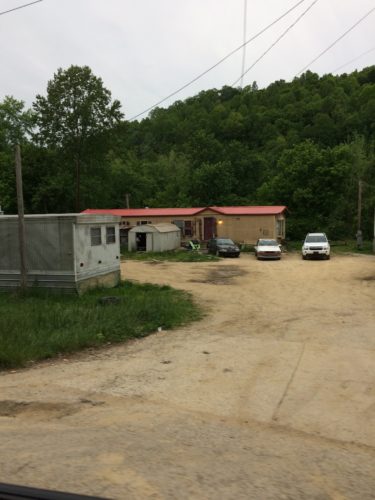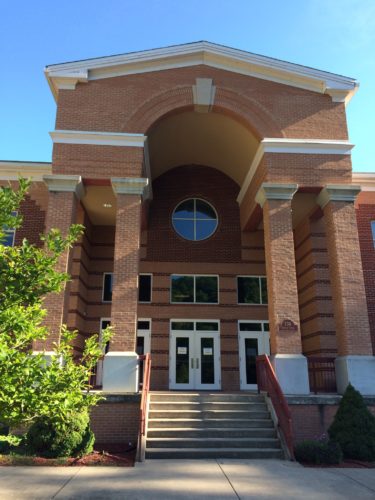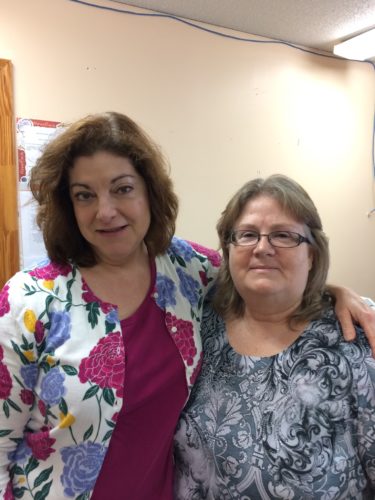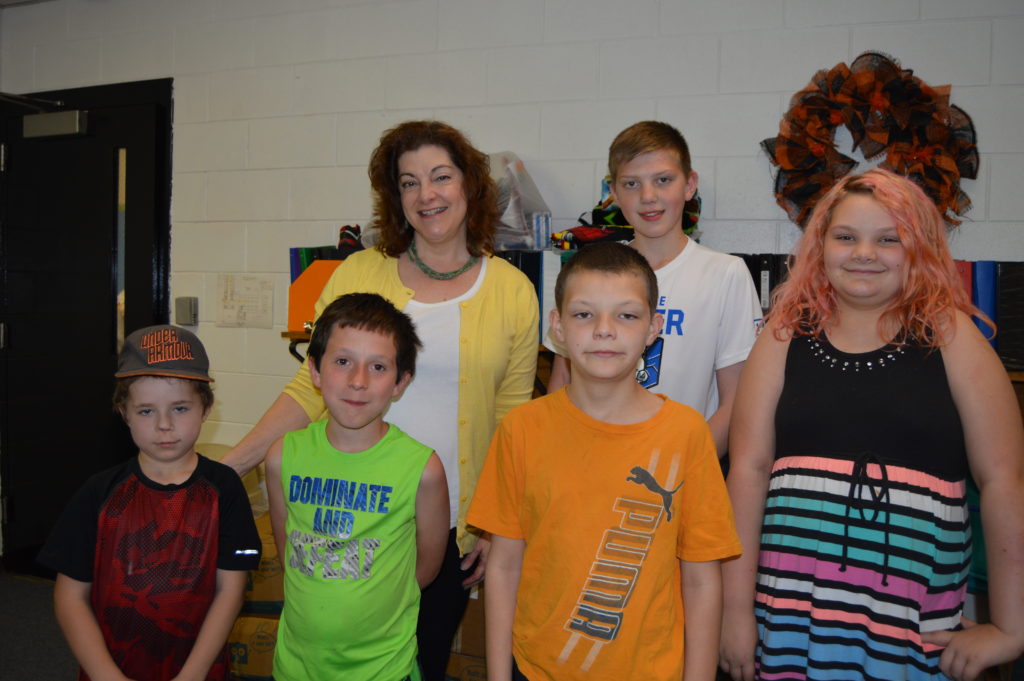In May of this year, Renée Kube, our Director of U.S. Programs, and Shelley Oxenham, U.S. Projects Specialist, traveled to Kentucky together to visit two counties that Children Incorporated serves. Once they arrived in Kentucky, they split up – Renée in the direction of Martin County, and Shelley to Magoffin County. Both counties are close to each other in proximity, east of Lexington, and are two of the poorest counties in our nation.
For many children, their only hot meals of the day are at school.
In Martin County, the median yearly household income is $27,484; it is ranked as having the greatest rental cost burden in the state, and the poverty rate is 35.2 percent. In Magoffin County, the median yearly household income is $29,421; it has the fifth-greatest rental cost burden in the state, and the poverty rate there is 28.6 percent.

A community of trailers in Martin County, Kentucky – many of our sponsored children live in homes like these.
Some of the most severe poverty in both counties is out of the sight of state and county roads, and away from the county seats. This poverty is tucked in hollows between mountains, or up their ridges. According to research from the Annie E. Casey Foundation’s Kids Count Data Center, of the 119 counties in Kentucky, the 25 with the highest rates of child poverty include both Magoffin and Martin Counties. Not surprisingly, both counties also rank poorly on other measures of child well-being.
WHEN Disaster Strikes
Renée remembers very clearly when, more than five years ago, on March 2 and 3, 2012, a tornado outbreak occurred over a large part of the southeastern U.S. There were a total of seventy confirmed tornadoes that resulted in 41 fatalities, 22 of which occurred in Kentucky. The counties affected included Children Incorporated-affiliated projects in Bath, Johnson, Lawrence, Menifee, Morgan, and Wolfe Counties, as well as in Martin and Magoffin counties in Kentucky.
After the disaster, our volunteer coordinators went to the schools as soon as they had the chance, and began contacting families to see what they needed — some of their houses had been damaged or destroyed, and many had lost a lot of their belongings, and didn’t have the means to even begin to clean up the mess from the tornadoes.
As information arrived from the coordinators to Renée about the needs of the families, Children Incorporated put out an appeal to donors and sponsors to help, and contributions began pouring in. From March to May 2012, Children Incorporated raised a total of $10,818. Our President and CEO, Ron Carter, delivered some of these disaster relief checks in person to various counties, which provided the families with emergency supplies such as replacement clothing, food, and cleaning supplies, like bleach.
Both Terrie and Debbie say that the biggest barrier for families is a lack of reliable transportation.
It was so important to be able to help individual families during this time of crisis; but unfortunately, much more extensive damage had been done to a few schools. In Magoffin County, three schools were damaged: Salyersville Elementary, Herald Whitaker Middle, and Magoffin County High. The elementary and high schools were repairable, but the middle school was not; so those students were moved into the high school building, where they shared tight quarters – and that was the situation for almost five years.
Welcome to Martin County

Exterior view of Martin County Middle School
Back in 1964, Martin County was the Appalachian county that gave a face to President Lyndon B. Johnson’s ‘”War on Poverty.” Many residents vividly remember when the president visited the Fletcher home to speak with them about their struggles. Over fifty years later, improvements to the communities in Appalachia have occurred; most have been made, however, in the outer bands of the area, and not in regions such as Martin County.
The central core of the Appalachian region still lags behind the rest of the nation in most measures. Schools have greatly improved, but mining jobs have steeply declined, leaving many residents with few options for work. The remaining jobs are mostly service-related, such as at small stores and convenience marts. The hours are often part-time only, and the pay is minimum wage with few or no benefits.
As a result, many people still live on government aid of one kind or another. But poverty has remained high for the poorest residents. The loss of mining jobs has meant high unemployment; many families have moved away. Those who have remained continue to struggle. For many children, their only hot meals of the day are at school. Drug abuse compounds poverty in a cycle of hopelessness, and it is children who are the most vulnerable. Social service professionals are grateful for the programs that exist, but agree with the families that programs won’t render long-term improvements without decent employment opportunities.
Sheldon Clark High School’s Shining Stars
At Sheldon Clark High School, one of five schools in Martin County that Renée visited on her trip, Children Incorporated is well-served by two amazing women: Terrie Simpkins is the Youth Services Center Coordinator, and Debbie Fluty is the Assistant Coordinator. Both have been employed by the school system for a long time, and they have years of experience working with Children Incorporated at multiple schools in Kentucky.
Despite the consistently trying circumstances in which this young man lives, support from Thomas’ Children Incorporated sponsor presents him with opportunities he most certainly wouldn’t have otherwise.
Terrie and Debbie are responsible for a wide variety of programming for their high school students, including referrals to health-related and social services, career exploration and development, summer and part-time job development, and alcohol and drug awareness and addiction prevention. But their budget is a shoestring one; both Terrie and Debbie are constantly overworked and overwhelmed with the needs of the students and their families, as they are both fiercely devoted to supporting them.

Renée and Terrie pose for a photo together.
Terrie conducts regular needs assessments; the top requests are help for clothing, shoes, hygiene items, and dental care. Terrie and Debbie have repeatedly stated that our sponsorship program is a godsend — that the kids would have almost nothing without their sponsors’ help.
Both Terrie and Debbie say that the biggest barrier for families is a lack of reliable transportation. Families have trouble finding and keeping jobs when their old cars break down, or when they cannot afford to buy one in the first place. There are students who are desperate for work to help their families — but after-school jobs are few and far between.
Debbie and Terrie shared that there are few local businesses or churches that are in a position to help, and those that can are inundated with requests. Most of the responses from the community for support go to the three elementary schools. A lot of the time, most people like to help younger kids, so teenagers are often forgotten and overlooked.
Meeting a Special Senior
Renée met with one student while at Sheldon – a rising twelfth-grade boy named Thomas* who is homeless and sleeping in a barn; there are no vacancies at the only federal housing project in the county. Thomas has no money to pay rent or utilities at the trailer parks. Terrie called him into the office, and Renée was able to meet him and hear his story.
He has such a positive attitude, and he is determined to stay in school and get his diploma, even though he has no home to go to. Normally, a guardian would sign the forms to enroll a child in our program; but since Thomas is eighteen, he was able to enroll himself in our program, so he will be able to get the support he needs to get him through the end of the school year and graduation.
Despite the consistently trying circumstances in which this young man lives, support from Thomas’ Children Incorporated sponsor presents him with opportunities he most certainly wouldn’t have otherwise.
*Name changed for child’s protection.
***
HOW DO I SPONSOR A CHILD IN KENTUCKY?
You can sponsor a child in Kentucky in one of two ways – call our office and speak with one of our sponsorship specialists at 1-800-538-5381, or email the sponsorship department at sponsorship@children-inc.org.

